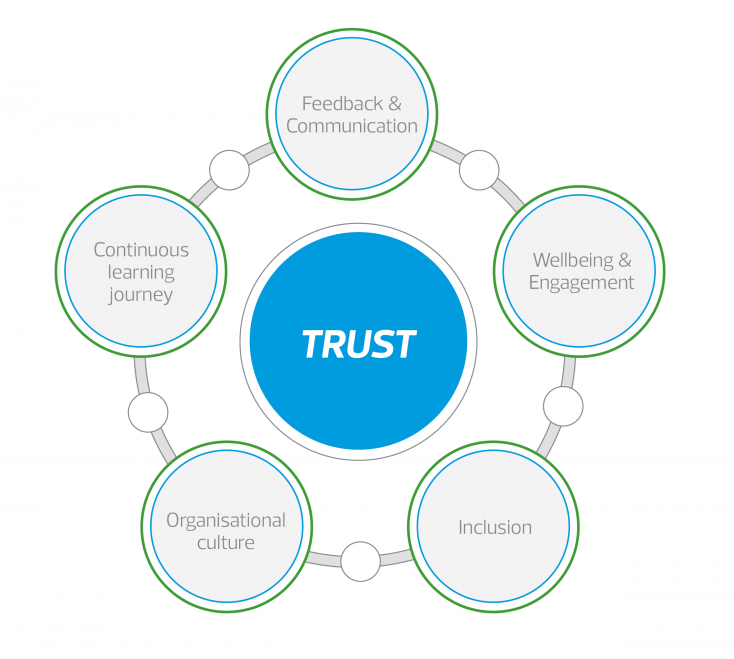In many industries, organisations around the world are evolving to meet both the changing expectations of their people while meeting the needs of the business following the impact of the global pandemic. An unexpected catalyst for change, employers and employees fully embraced the power of technology - discovering that remote working can achieve enhanced productivity and a better work/life balance.
As the world moves towards a post-pandemic state, what does the future hold for a return to the workplace? Will hybrid working become the norm and what are the HR implications?
In the UK, RSM held an event on the topic of “Hybrid working and embracing the future of work”. As part of that webinar hosted by David Williams-Richardson, Hannah Gibson Patel, Senior HR Consultant and Candice Eaton Gaul, Diversity & Inclusion Leader from RSM International discussed some of the emerging themes from the HR implications of hybrid working. Below is a transcript of this discussion.
Hannah: In the conversations I’ve been having with clients over the recent months, these are the key themes that are coming through and I’m joined here by Candice Eaton Gaul to talk through each of these themes.
Feedback & communication has been front and centre throughout the pandemic as we’ve needed to adapt to new ways of working almost overnight, but for HR this really needs to remain the primary focus to ensure that we bring everyone on the journey with us. At RSM we’ve been regularly surveying employees throughout the past 16-months to understand how our colleagues want to work in future, what’s working and what’s not, and the concerns that we may have around returning to the workplace.
From an organisational perspective, I don’t think it’s possible to over invest in communication during times of change and uncertainty. Once we’ve gathered employee sentiment, we then need to build it in to our decision making, and feedback across the organisation what we are hearing, what might be changing, and critically the rationale for our decisions. If we have arrived at the decision for employees to be in the office two or three days a week – on what basis are we making that decision – what is their purpose in being in the workplace? Using technology, such as online surveying tools, which we’ve been providing for clients, keeps the feedback loop short and following up with manager 1:1’s to ensure employees are heard is crucial.
Candice, here in the UK we’ve seen a significant increase in job postings from pre-pandemic conditions, some people are also indicating we’re on the verge of a recruitment crisis – I guess the risk is that if we don’t get this right, our employees may vote with their feet in this buoyant candidate market?
Candice: Thank you Hannah, I am so pleased to be here and talk to you on this topic, and to start I can’t agree with you more that it’s not possible to over-invest in communication.
To answer your question, globally we are starting to see an increase in recruitment for specific roles, many of the roles that are opening up are those that require specialist experience and scarce skill sets.
The success of the ability to work remotely has opened up those scarce skills roles to a much wider geographic region, and now, many multinationals are relooking at their strategies for top talent acquisition to specifically search a broader area, and this comes with the need to consider the HR, legal and tax consequences of hiring outside of the local environment.
Of course, this is also providing HR with a new Challenge as new competitors in the talent market begin to threaten retention, so redesign of purposeful retention planning is also on the increase.
Hannah: Which brings us on to the next focus of Wellbeing and Engagement – sadly and perhaps unsurprisingly mental health is worse this side of the pandemic than it was before – and it wasn’t good then! Statistics indicate that 1 in 5 adults experienced some form of depression in early 2021; this figure has more than doubled compared to before the pandemic. Whilst we’ve seen some real wins from remote working such as more social and leisure time, being able to adjust our working day to fit our more natural rhythms or family schedules, it’s also brought some real challenges too, employees have found themselves, working longer hours, sometimes in far less than ideal environments, unable to switch off, and with constant screen fatigue as we jump from one virtual meeting to the next – so this is definitely a double-edged sword.
Some of the clients I’ve spoken to are having to initiate some really comprehensive solutions in this area, not only in setting some parameters around good practice, and encouraging or facilitating things like yoga and exercise classes, but also implementing employee helplines or even employing clinical psychologists. One NHS client I spoke with last week is now monitoring absence on a daily basis.
This is a big topic that we don’t have time to do justice now, but is there one thing you think we should be doing to build this into our strategy and approach, it’s certainly something we need to now build into manager skillsets isn’t it?
Candice: Yes, employee engagement has really come to the forefront of the minds of many employers and certainly something to be intentional about.
If I had to say one aspect of employee engagement that’s been a real step change in employer employee relationships is the focus on employee health and wellbeing, and you’re absolutely right, there has been a drive to ensure that people are encouraged and sufficiently skilled enough to support their colleagues in being able to recognise when support is needed, as well as what to do in that instance. I do expect that as we begin to see hybrid models appearing, the employers with strong relationships with employees will continue to focus on health and wellbeing and decentralise that responsibility by ensuring that there is a higher duty of care at managerial level in this regard.
The decentralisation of that duty of care is an interesting change as it really broadens responsibility of the employee experience and the expectation of authenticity in caring for colleagues as an inherent aspect of leadership.
Hannah: Inclusion – Now Candice this is really your area of expertise – and again unfortunately statistics show the pandemic has had a detrimental impact on women who have taken more responsibility for childcare, of course we have seen greater numbers of people in BAME (Black, Asian and Minority Ethnic) populations impacted by Covid itself, and we know that those with disabilities and underlying health conditions have needed to be shielded and protected. And so, as we open up the workplaces and consider how we manage the dynamics of this blended approach – how do we ensure that we don’t unintentionally discriminate or unlevel the playing field that we have worked so hard to level out over recent years?
Candice: Well Hannah there have been a few interesting benefits, remote work allows for the decline in significance of geographic location, which brings opportunity to remain competitive in a tough talent market by looking further afield, and that provides a great way to boost diversity in many different ways.
You’re also absolutely correct in the need to really think hard about how return to the workplace could unintentionally affect people in minority or underrepresented groups. So in designing hybrid models, employers should consider the effect of various scenarios on people with disabilities and health conditions, people who may live in cheaper areas further away from business hubs and the associated time and cost of transport, of course primary caregivers, and even catering specifically to covid long-haulers, and it may be that within one organisation, there are many different models of hybrid working.
Of course, how to be inclusive and particularly to put in place measures to avoid proximity bias, should be an inextricable part of any hybrid work plan, to make sure that those who are not physically present are not overlooked for development and opportunity.
Hannah: Absolutely, and actually organisational culture impact of these new ways of working has definitely been a concern or at least key consideration for the clients I’ve been speaking with – how do you translate a culture which can be so entrenched in the physical environment into an online platform or mixture of the two? But I think we have a real opportunity now, to think about what the culture of our organisation is, what we want it to be and how we then embed that through the new patterns of working – would you agree?
Candice: Absolutely Hannah there are real opportunities in the space of organisational culture and how the employment relationship and communication has shifted over the last 18 months. People have been communicating in shorter bursts more often and creating virtual and physical spaces for collaboration and innovation is certainly going to play a bigger role in future and it will even change what office layouts look like.
As we’ve discussed, top talent mobility is a pressing issue, and we may start seeing more of these hybrid work models purposefully catering to the gig worker where the outcome of the work is the focus and in those instances the employer culture and the opportunity for development, or experience would be the major draw cards.
When it comes to culture, employers would really benefit from including in their strategy plan, how to ensure employees understand their individual significance in the contribution they make to the shared purpose and objectives of the entity they serve.
Hannah: Continuous learning journey – before Covid, organisational agility was something that we had started to talk about but there’s nothing like a global pandemic to test our thinking and approach is there?!
Candice: Hannah you are absolutely right this has been a test! As you know trends that we are now seeing are not new, but they have evolved much faster than we expected, we have been talking about mobility of employees, the effect of hyper transparency and hyper connectivity but in 18 months it all became a daily reality and we learnt to do things differently.
I think at the heart of each of these considerations we have chatted about is the trust relationship between employer and employee, with employers and employees who have high levels of mutual trust looking to benefit the most at present, and in future from higher employee engagement, and employers and employees that listen and engage with each other.
Probably the most important aspect in considering hybrid work models is that we have been in a cycle of adaptation, so one size fits all is unlikely to be appropriate throughout an organisation, but it is still necessary to ensure that there is still fairness and consistency in how flex or hybrid options are applied.
We’ve all learnt some hard lessons about change, and hybrid models should be rolled out with communication that employees should anticipate that policies will continue to shift and change over time as business need changes, in a much more fluid way than we have seen in the past. This also makes HR consultants such as yourself a really useful asset for clients in the design and implementation of strategies, policies and procedures that are expected to continue to evolve.
Hannah: Thanks Candice, I think for me, as we move through this continuing cycle of change and experimentation, we need to ensure we are regularly monitoring data to inform our decision making, not only employee sentiment but obviously business and personal performance too – what’s your dashboard telling you, how can you adjust things again to make further improvements and so on? We’re all learning to do things differently, so being really clear and intentional about the outputs we’re seeking, but all within the context of a clear organisational purpose, helps to keep focussed on the goal as we navigate the journey.

During the remainder of webinar, RSM UK’s People Advisory Services specialists, unpacked a number of other implications from a tax, employment law and global mobility perspective to raise awareness with clients as they create their new models and policies around hybrid working.
You can listen to the webinar here.
If you would like more information on our HR Consulting and Advisory Services in your geographic location, please contact Candice Eaton Gaul








